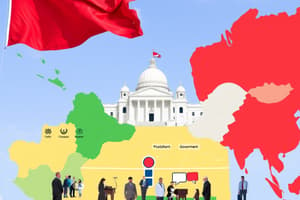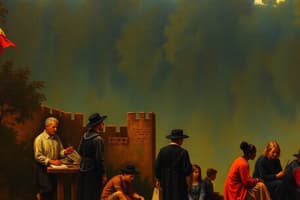Podcast
Questions and Answers
What is a primary reason presented for needing definitions of words?
What is a primary reason presented for needing definitions of words?
- To memorize language better
- To use more complex language
- To replace old words with new ones
- To clarify meaning when words are used differently (correct)
Computers are primarily used today for computing difficult mathematical sums.
Computers are primarily used today for computing difficult mathematical sums.
False (B)
What example does Merry give to illustrate her point about definitions?
What example does Merry give to illustrate her point about definitions?
The example of democracy and how its meaning can change.
We require a definition of __________ only when we wish to distinguish it from similar terms like drizzle or cloudburst.
We require a definition of __________ only when we wish to distinguish it from similar terms like drizzle or cloudburst.
Match the following words to their usage:
Match the following words to their usage:
What party dominated elections in Mexico until the year 2000?
What party dominated elections in Mexico until the year 2000?
Mexico has always been under military rule.
Mexico has always been under military rule.
What were teachers of government schools known to do in relation to elections?
What were teachers of government schools known to do in relation to elections?
Mexico holds elections every _____ years to elect its President.
Mexico holds elections every _____ years to elect its President.
Match the following terms with their descriptions:
Match the following terms with their descriptions:
Flashcards
Democracy
Democracy
A system of government where supreme power is vested in the people and exercised by them directly or indirectly through a system of representation, usually involving periodic free and fair elections.
Election
Election
The process of choosing leaders through a vote, where every eligible citizen has the right to participate.
PRI (Institutional Revolutionary Party)
PRI (Institutional Revolutionary Party)
A political party that held power in Mexico for many years, often accused of unfair election practices.
Dirty Tricks
Dirty Tricks
Signup and view all the flashcards
Media Influence
Media Influence
Signup and view all the flashcards
Meaning through Use
Meaning through Use
Signup and view all the flashcards
Necessity of Definitions
Necessity of Definitions
Signup and view all the flashcards
Defining and Redefining.
Defining and Redefining.
Signup and view all the flashcards
Evolving Meaning
Evolving Meaning
Signup and view all the flashcards
Dynamic Nature of Language
Dynamic Nature of Language
Signup and view all the flashcards
Study Notes
Overview of Democracy
- Democracy is the most common form of government globally, and it's spreading to more countries.
- This chapter investigates the meaning and features of democracy, differentiating it from non-democratic forms of governance.
- The chapter explores the reasons for democracy's prevalence and its advantages over other systems of government.
What is Democracy?
- Democracy is a form of government where rulers are elected by the people.
- This simple definition is a starting point but needs further exploration. A clear definition is needed because different types of governments use the term in different ways.
- The meaning of words can evolve over time, making focusing on origins insufficient.
Why Define Democracy?
- Defining democracy helps distinguish it from other forms of government, particularly those that aren't democratic.
- Defining democracy in detail is essential because different types of governments claim to be democratic.
- The initial steps in defining democracy are the identification of basic features.
- Examining the definition in practice allows us to determine whether a given system of government meets these requirements.
Features of Democracy
- Rulers are elected by the people.
- Elections offer a real choice.
- Elections are open to all citizens.
- Laws and citizens’ rights define limits to governmental power.
- The exercise of this choice leads to a government limited by basic rules of the constitution and citizens’ rights.
Why Democracy?
- Democracy prioritizes responding to the needs of the people.
- It is based on consultation and discussion, in contrast to other forms of government.
- It involves several people, leading to more comprehensive perspectives.
- It involves many people, resulting in decisions that are often more appropriate and considered.
- Democratic decision-making takes time. However, the process reduces rash or irresponsible decisions.
- Democracy fosters greater dignity and equality in citizens.
Broader Meanings of Democracy
- Democracy is applicable in other contexts beyond the governance of a country, such as within families or organizations.
- Democracy involves consultation with all those affected by decisions.
- It emphasizes considering the preferences of those who are affected by decisions, similar to how government decisions must take account of the citizens affected.
Democracy and Other Government Forms
- Democracy is distinguished from non-democratic forms of government by its emphasis on the popular election of leaders, the freedom to vote, and respect for individual rights.
- Systems of government without elections or where the rule of law isn't followed cannot be considered democratic.
- In a democratic system, the rule of law protects individual rights and ensures checks on the power of the government.
Studying That Suits You
Use AI to generate personalized quizzes and flashcards to suit your learning preferences.





